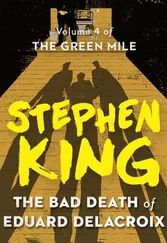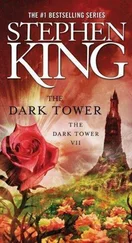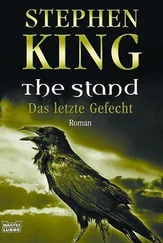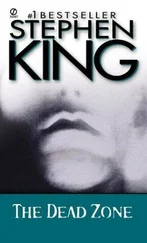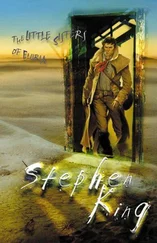Stephen King - The Langoliers
Здесь есть возможность читать онлайн «Stephen King - The Langoliers» весь текст электронной книги совершенно бесплатно (целиком полную версию без сокращений). В некоторых случаях можно слушать аудио, скачать через торрент в формате fb2 и присутствует краткое содержание. Жанр: Фантастика и фэнтези, Триллер, на английском языке. Описание произведения, (предисловие) а так же отзывы посетителей доступны на портале библиотеки ЛибКат.
- Название:The Langoliers
- Автор:
- Жанр:
- Год:неизвестен
- ISBN:нет данных
- Рейтинг книги:5 / 5. Голосов: 1
-
Избранное:Добавить в избранное
- Отзывы:
-
Ваша оценка:
- 100
- 1
- 2
- 3
- 4
- 5
The Langoliers: краткое содержание, описание и аннотация
Предлагаем к чтению аннотацию, описание, краткое содержание или предисловие (зависит от того, что написал сам автор книги «The Langoliers»). Если вы не нашли необходимую информацию о книге — напишите в комментариях, мы постараемся отыскать её.
The Langoliers — читать онлайн бесплатно полную книгу (весь текст) целиком
Ниже представлен текст книги, разбитый по страницам. Система сохранения места последней прочитанной страницы, позволяет с удобством читать онлайн бесплатно книгу «The Langoliers», без необходимости каждый раз заново искать на чём Вы остановились. Поставьте закладку, и сможете в любой момент перейти на страницу, на которой закончили чтение.
Интервал:
Закладка:
“Do you really think that’s possible?” Nick asked. Brian looked at him closely to see if the question was sarcastic. It didn’t appear to be, but it was hard to tell. The British were famous for their dry sense of humor, weren’t they?
Brian started to tell him he had once seen something just like that on an old Twilight Zone episode and then decided it wouldn’t help his credibility at all. “It’s pretty unlikely, I suppose, but you get the idea — we just don’t know what we’re dealing with. We might hit a brand-new mountain in what used to be upstate New York. Or another plane. Hell — maybe even a rocket-shuttle. After all, if it’s a time-warp, we could as easily be in the future as in the past.”
Nick looked out through the window. “We seem to have the sky pretty much to ourselves.”
“Up here, that’s true. Down there, who knows? And who knows is a very dicey situation for an airline pilot. I intend to overfly Bangor when we get there, if these clouds still hold. I’ll take us out over the Atlantic and drop under the ceiling as we head back. Our odds will be better if we make our initial descent over water.”
“So for now, we just go on.”
“Right.”
“And wait.”
“Right again.”
Nick sighed. “Well, you’re the captain.”
Brian smiled. “That’s three in a row.”
4
Deep in the trenches carved into the floors of the Pacific and the Indian Oceans, there are fish which live and die without ever seeing or sensing the sun. These fabulous creatures cruise the depths like ghostly balloons, lit from within by their own radiance. Although they look delicate, they are actually marvels of biological design, built to withstand pressures that would squash a man as flat as a windowpane in the blink of an eye. Their great strength, however, is also their great weakness. Prisoners of their own alien bodies, they are locked forever in their dark depths. If they are captured and drawn toward the surface, toward the sun, they simply explode. It is not external pressure that destroys them, but its absence.
Craig Toomy had been raised in his own dark trench, had lived in his own atmosphere of high pressure. His father had been an executive in the Bank of America, away from home for long stretches of time, a caricature type-A overachiever. He drove his only child as furiously and as unforgivingly as he drove himself. The bedtime stories he told Craig in Craig’s early years terrified the boy. Nor was this surprising, because terror was exactly the emotion Roger Toomy meant to awaken in the boy’s breast. These tales concerned themselves, for the most part, with a race of monstrous beings called the langoliers.
Their job, their mission in life (in the world of Roger Toomy, everything had a job, everything had serious work to do), was to prey on lazy, time-wasting children. By the time he was seven, Craig was a dedicated type-A overachiever, just like Daddy. He had made up his mind: the langoliers were never going to get him.
A report card which did not contain all A’s was an unacceptable report card. An Awas the subject of a lecture fraught with dire warnings of what life would be like digging ditches or emptying garbage cans, and a B resulted in punishment — most commonly confinement to his room for a week. During that week, Craig was allowed out only for school and for meals. There was no time off for good behavior. On the other hand, extraordinary achievement — the time Craig won the tri-school decathlon, for instance — warranted no corresponding praise. When Craig showed his father the medal which had been awarded him on that occasion — in an assembly before the entire student body — his father glanced at it, grunted once, and went back to his newspaper. Craig was nine years old when his father died of a heart attack. He was actually sort of relieved that the Bank of America’s answer to General Patton was gone.
His mother was an alcoholic whose drinking had been controlled only by her fear of the man she had married. Once Roger Toomy was safely in the ground, where he could no longer search out her bottles and break them, or slap her and tell her to get hold of herself, for God’s sake, Catherine Toomy began her life’s work in earnest. She alternately smothered her son with affection and froze him with rejection, depending on how much gin was currently perking through her bloodstream. Her behavior was often odd and sometimes bizarre. On the day Craig turned ten, she placed a wooden kitchen match between two of his toes, lit it, and sang “Happy Birthday to You” while it burned slowly down toward his flesh. She told him that if he tried to shake it out or kick it loose, she would take him to THE ORPHAN’S HOME at once. The threat of THE ORPHAN’S HOME was a frequent one when Catherine Toomy was loaded. “I ought to, anyway,” she told him as she lit the match which stuck up between her weeping son’s toes like a skinny birthday candle. “You’re just like your father. He didn’t know how to have fun, and neither do you. You’re a bore, Craiggy-weggy.” She finished the song and blew out the match before the skin of Craig’s second and third right toes was more than singed, but Craig never forgot the yellow flame, the curling, blackening stick of wood, and the growing heat as his mother warbled “Happy birthday, dear Craiggy-weggy, happy birthday to yoooou” in her droning, off-key drunk’s voice.
Pressure.
Pressure in the trenches.
Craig Toomy continued to get all A’s, and he continued to spend a lot of time in his room. The place which had been his Coventry had become his refuge. Mostly he studied there, but sometimes — when things were going badly, when he felt pressed to the wall — he would take one piece of notepaper after another and tear them into narrow strips. He would let them flutter around his feet in a growing drift while his eyes stared out blankly into space. But these blank periods were not frequent. Not then.
He graduated valedictorian from high school. His mother didn’t come. She was drunk. He graduated ninth in his class from the UCLA Graduate School of Management. His mother didn’t come. She was dead. In the dark trench which existed in the center of his own heart, Craig was quite sure that the langoliers had finally come for her.
Craig went to work for the Desert Sun Banking Corporation of California as part of the executive training program. He did very well, which was not surprising; Craig Toomy had been built, after all, to get all A’s, built to thrive under the pressures which exist in the deep fathoms. And sometimes, following some small reverse at work (and in those days, only five short years ago, all the reverses had been small ones), he would go back to his apartment in Westwood, less than half a mile from the condo Brian Engle would occupy following his divorce, and tear small strips of paper for hours at a time. The paper-tearing episodes were gradually becoming more frequent.
During those five years, Craig ran the corporate fast truck like a greyhound chasing a mechanical rabbit. Water-cooler gossips speculated that he might well become the youngest vice-president in Desert Sun’s glorious forty-year history. But some fish are built to rise just so far and no further; they explode if they transgress their built-in limits.
Eight months ago, Craig Toomy had been put in sole charge of his first big project — the corporate equivalent of a master’s thesis. This project was created by the bonds department. Bonds — foreign bonds and junk bonds (they were frequently the same) — were Craig’s specialty. This project proposed buying a limited number of questionable South American bonds — sometimes called Bad Debt Bonds — on a carefully set schedule. The theory behind these buys was sound enough, given the limited insurance on them that was available, and the much larger tax-breaks available on turn-overs resulting in a profit (Uncle Sam was practically falling all over himself to keep the complex structure of South American indebtedness from collapsing like a house of cards). It just had to be done carefully.
Читать дальшеИнтервал:
Закладка:
Похожие книги на «The Langoliers»
Представляем Вашему вниманию похожие книги на «The Langoliers» списком для выбора. Мы отобрали схожую по названию и смыслу литературу в надежде предоставить читателям больше вариантов отыскать новые, интересные, ещё непрочитанные произведения.
Обсуждение, отзывы о книге «The Langoliers» и просто собственные мнения читателей. Оставьте ваши комментарии, напишите, что Вы думаете о произведении, его смысле или главных героях. Укажите что конкретно понравилось, а что нет, и почему Вы так считаете.


